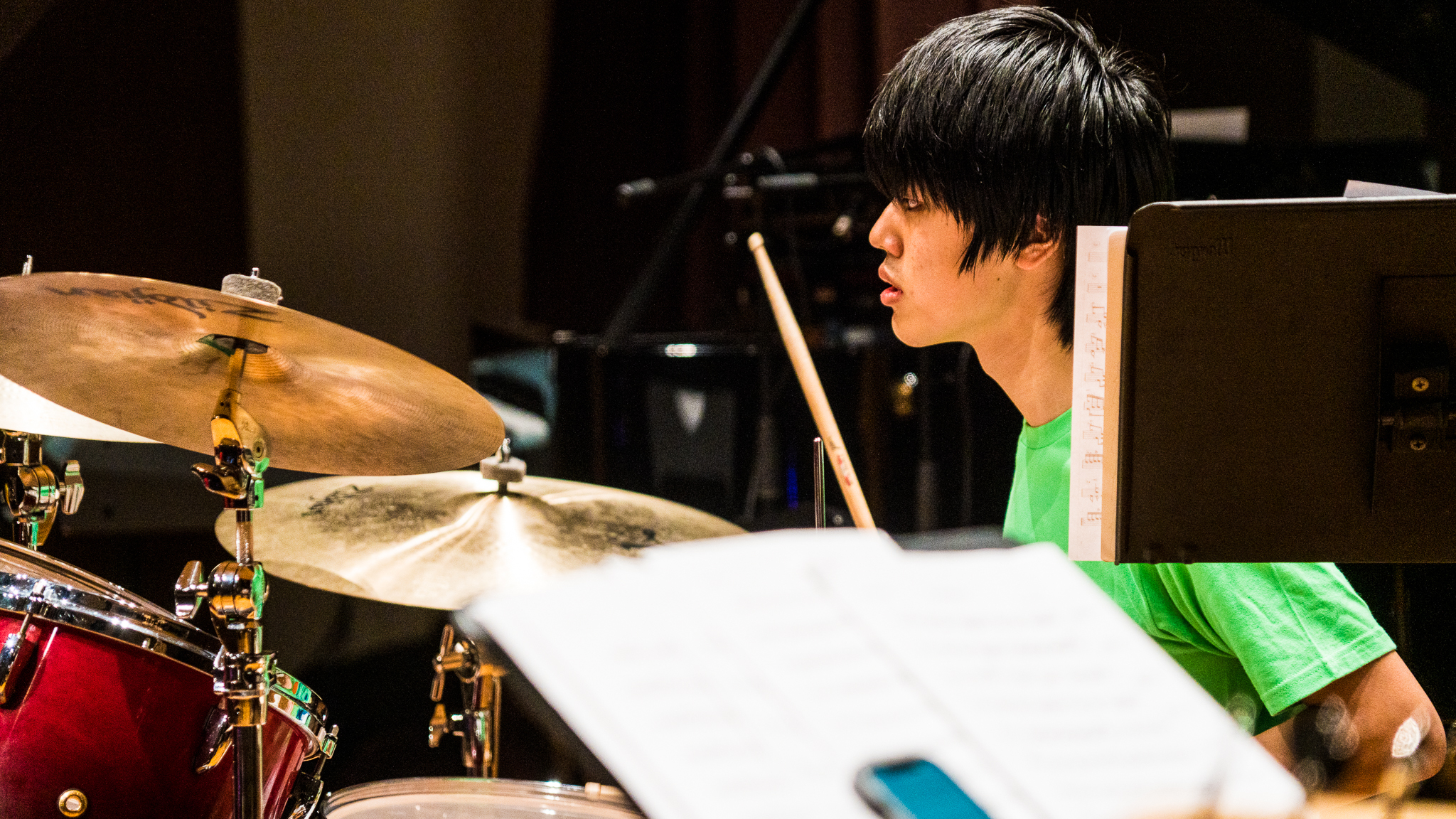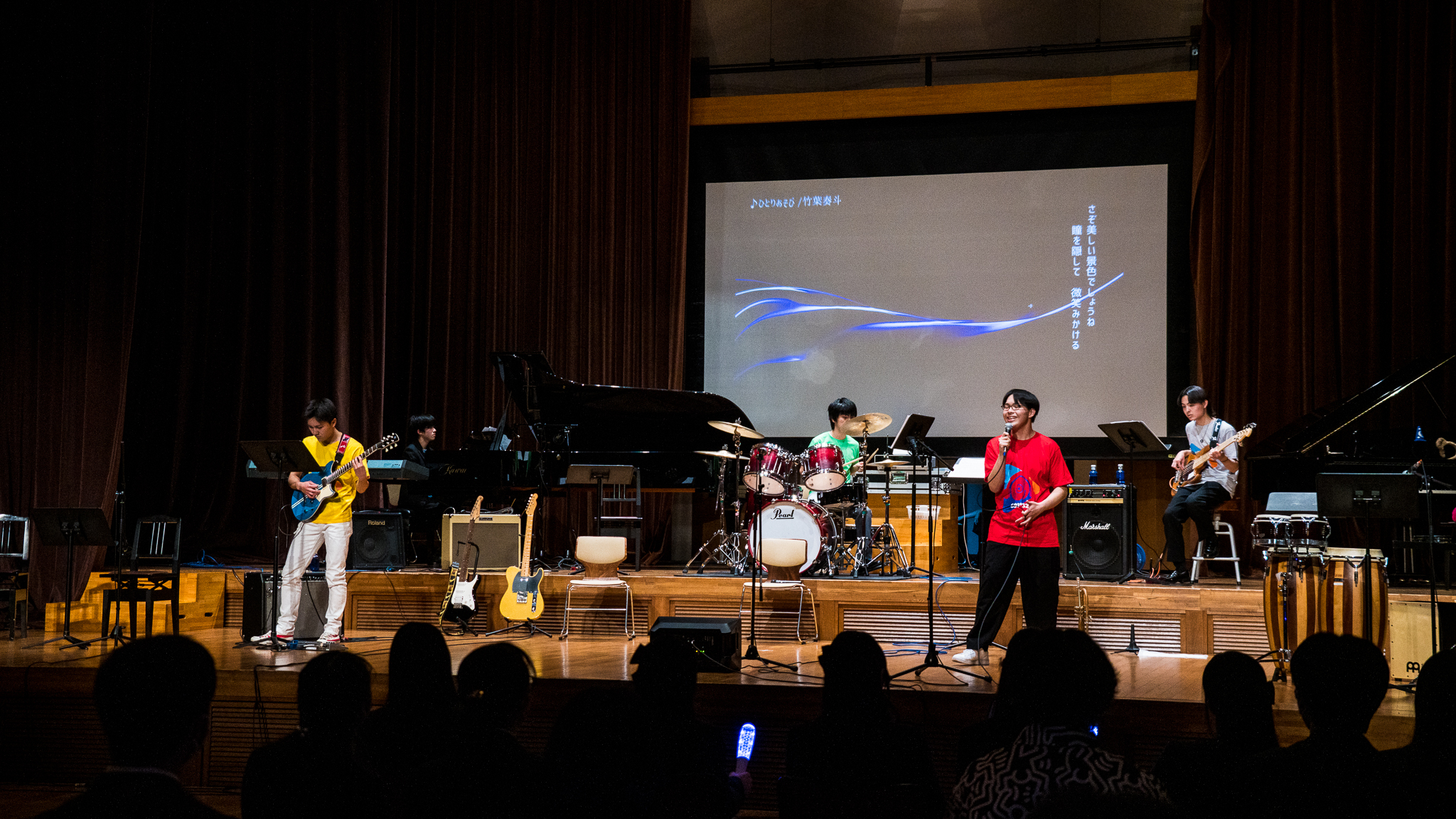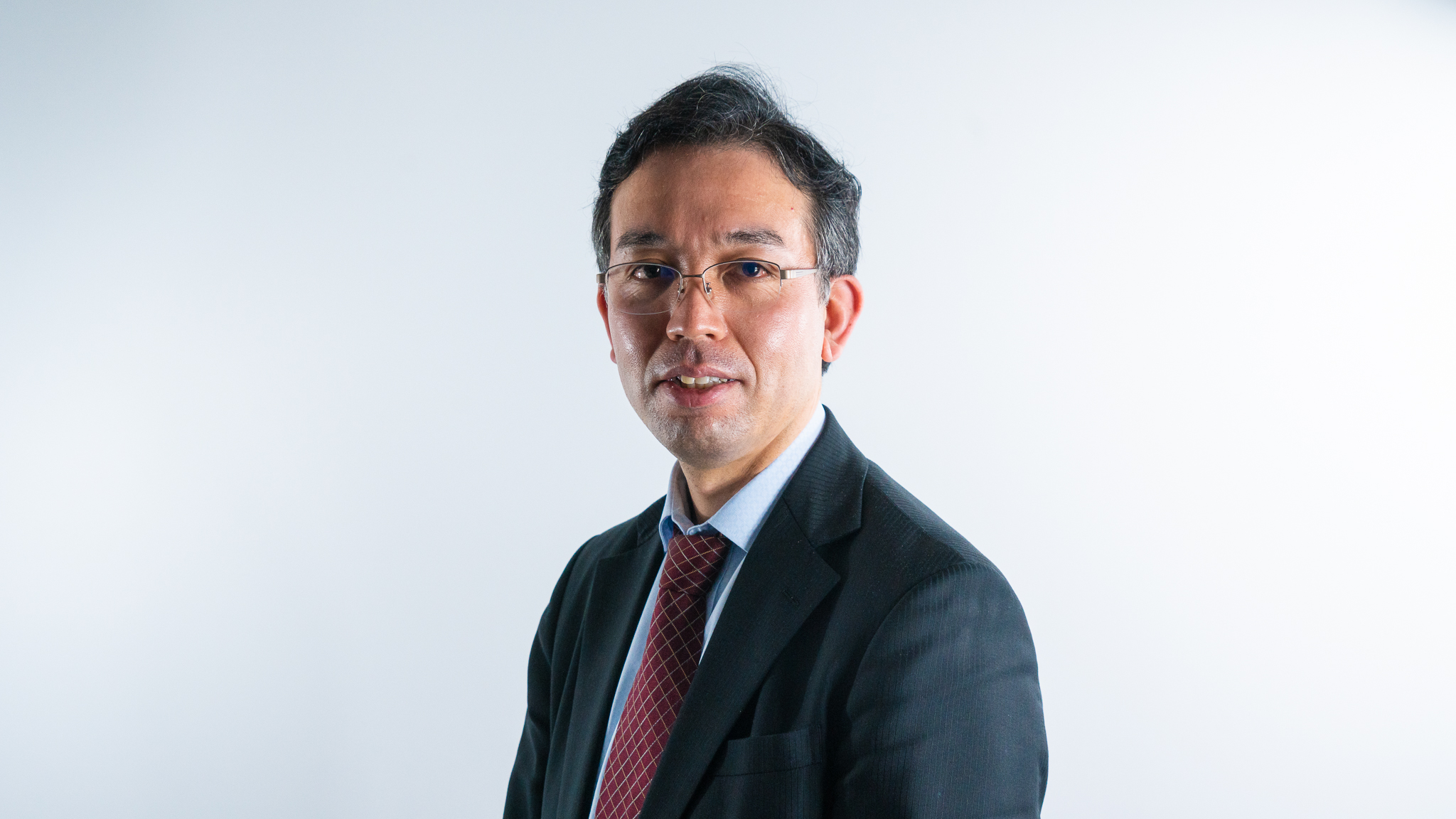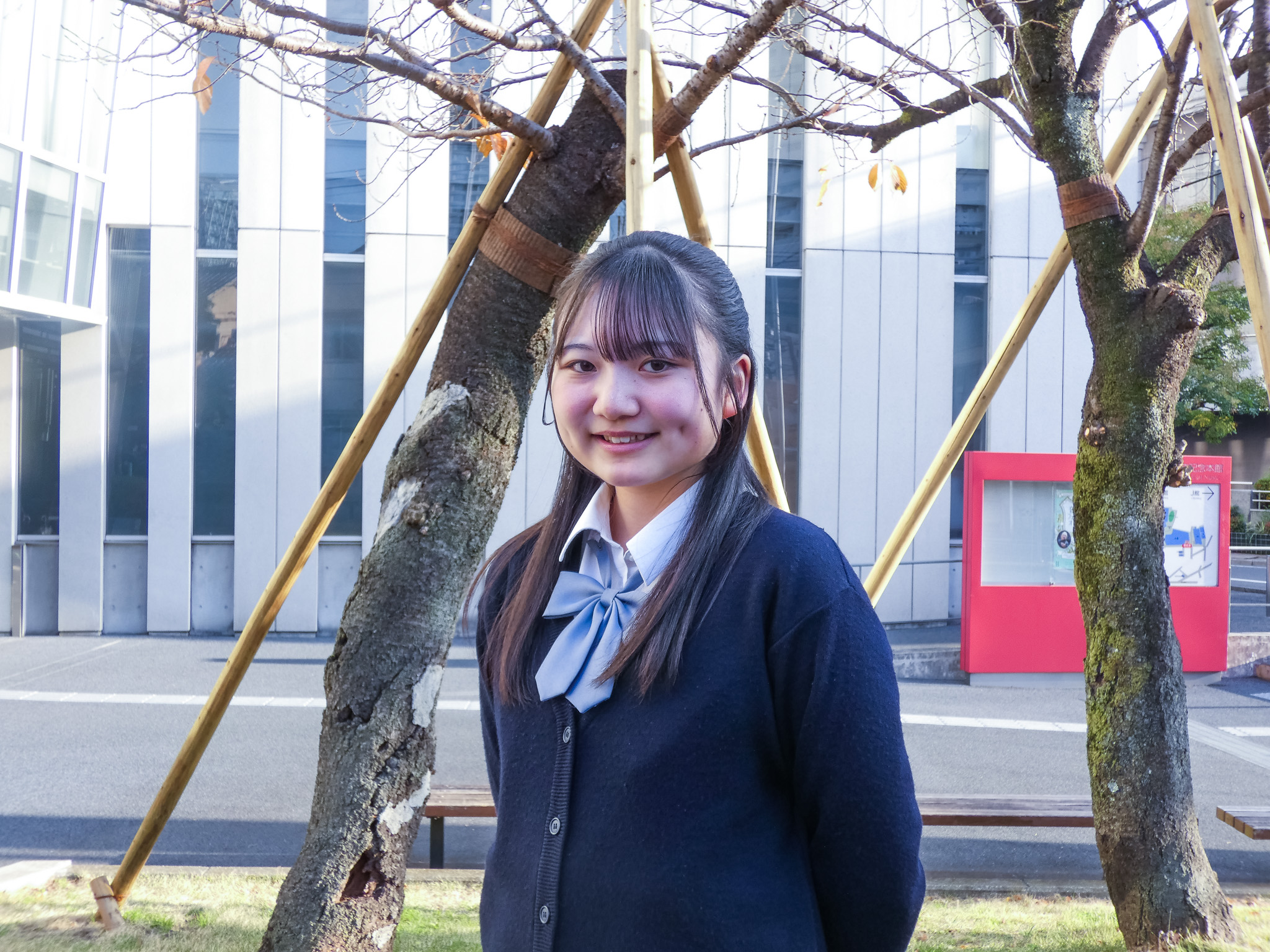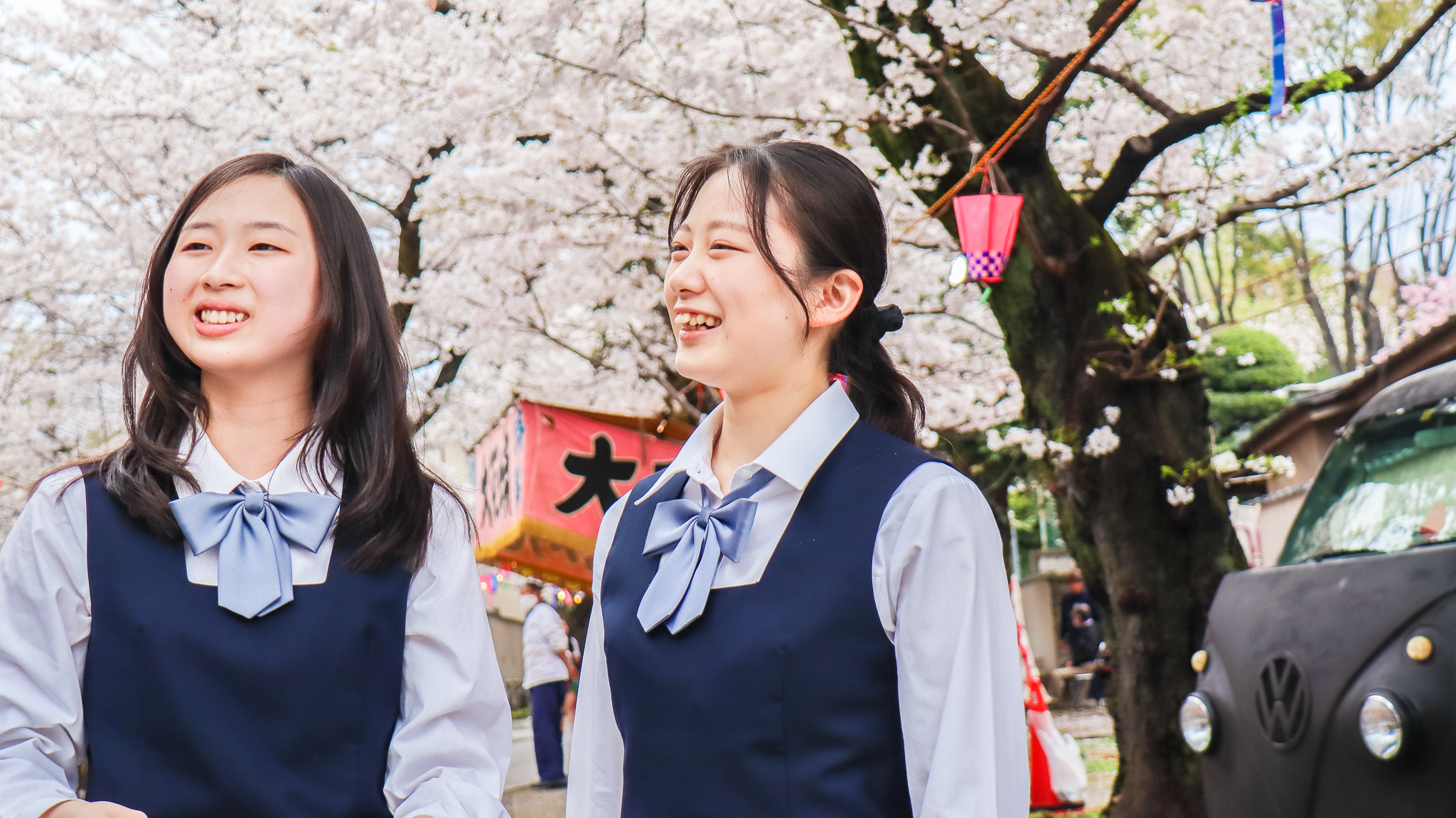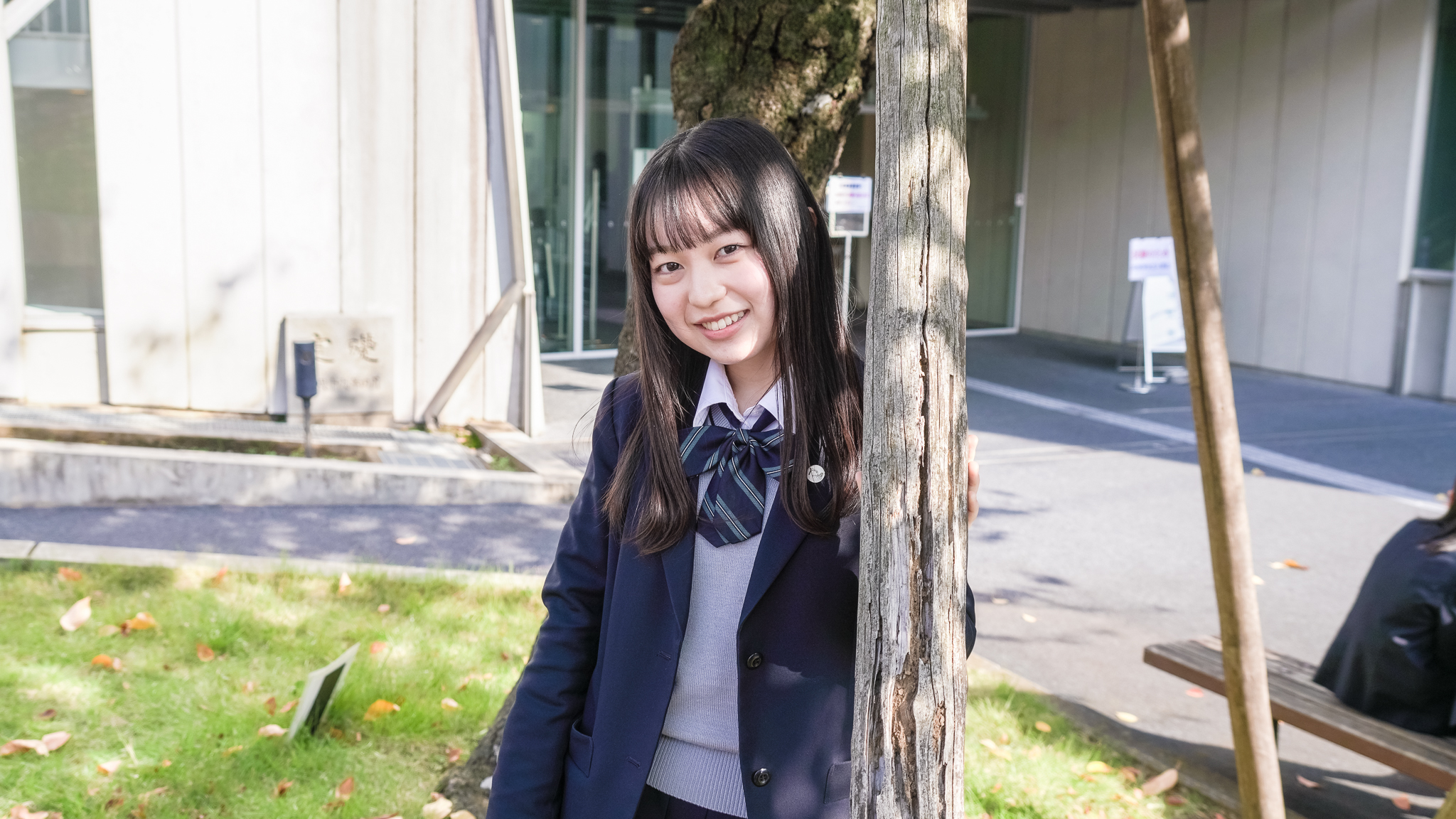What is the Distinguished Service Award?
At the "Farewell Party for Third-Year Students" hosted by the Student Council in March, the "Merit Award" is presented every year to the third-year volunteer group that the first- and second-year Student Council officers thought was most active at the Student Council-sponsored concerts and cultural festivals. This year, two groups received the award: "691*324," a six-member boys' jazz band, and "Taiyaki," a two-member girls' piano ensemble group. We would like to introduce these two groups to let everyone know what kind of volunteer activities are taking place at our school, which has no club activities.
As the second special feature of the Merit Award volunteer groups, we would like to introduce "691*324" (Rokkyuichi Sanniyon). This band is a jazz band consisting of six diverse male members: Tomoki Ikarashi (piano major), Chihiro Kawamoto (composition major), Tomonosuke Sunohara (music synthesis course), Kanato Takeba (music synthesis course), Shotaro Yoshida (classical guitar major), and Yuta Watanabe (trumpet major), and the members themselves The members themselves told us about their activities.
preface
After our recent two-hour solo live concert, we were finally spending our vacation with a sense of relief when Mr. Hayashi, who is in charge of the student council, asked us to write an article introducing 691*324 on the web. As a break, I would like to write on behalf of Igarashi and Takeha about the origins of the band, the gigs they performed, their thoughts during those gigs, and the introduction of the songs they arranged.
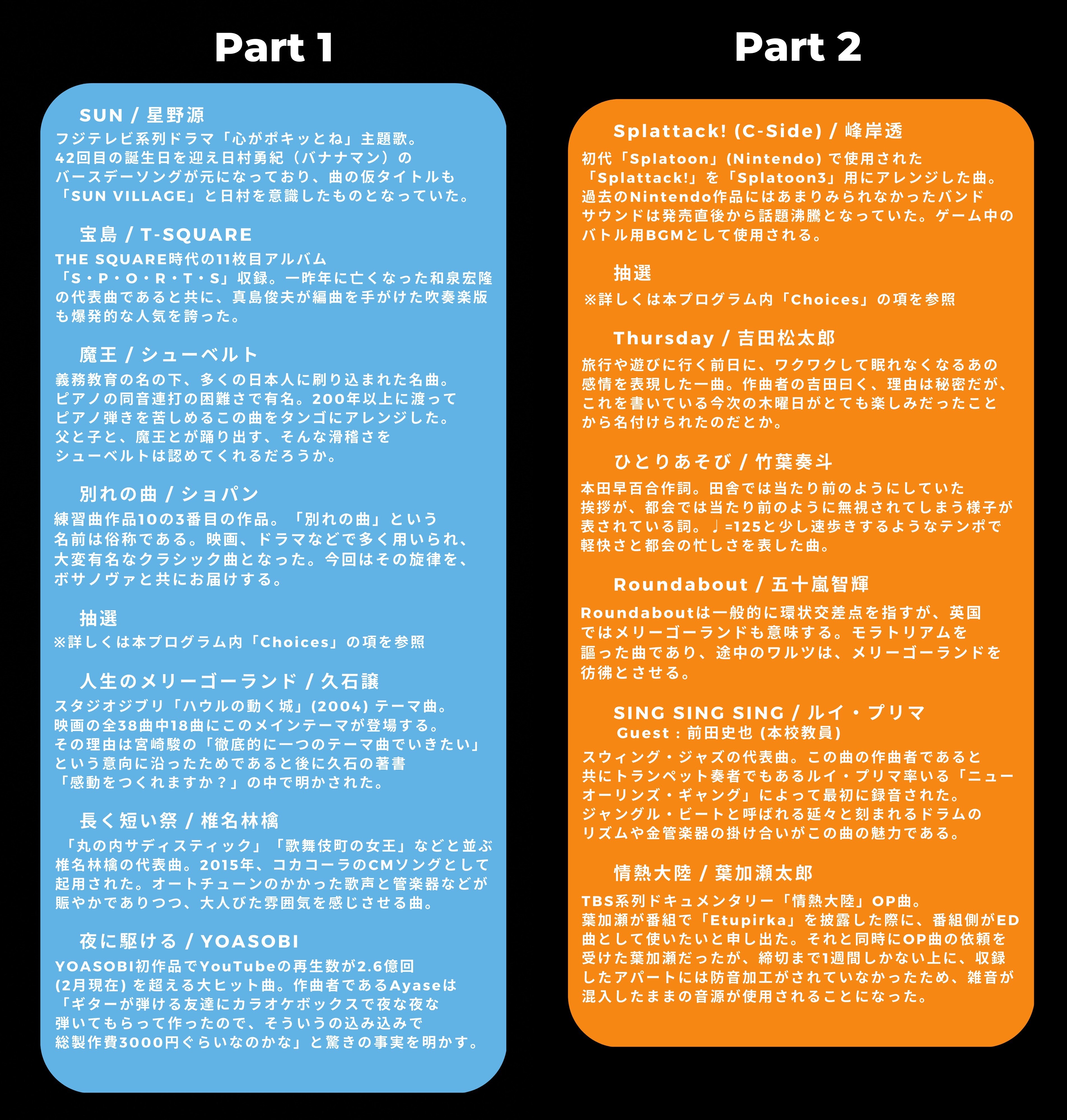
History of the Band" (written by Mr. Ikarashi)
Whenever I talk about 691*324, I always start with the initial three members (Igarashi, Kawamoto, and Takeba), but this time I would like to touch briefly on the "before" period. The group was not originally formed by the three of us, but initially consisted of Kawamoto and Takeba, who were working together for the first year high school festival. Igarashi, wanting to join the group, poked his head in several times, and the three of them talked together. Takeha eventually asked them to join, and the initial members of 691*324 were all together (I am not sure of the exact date, but the LINE group was created on 9/25, so it was probably around that time). The first activity was songwriting, with the three of us writing songs, writing lyrics, and having vocaloids sing them.
The first activity as a band was the Sansenkai in March. The band consists of a jazz trio: piano (Igarashi), bass (Kawamoto), and drums (Takeha). Due to the installation of drums, the band was only able to practice from late February, and for a while they discussed with their advisor, Mr. Maeda, whether or not to withdraw from the performance. In the end, everyone, including the teacher, sensed that it was going to be all right, and they arranged "Running Into the Night" as a jazz waltz and performed it. At this stage, the author himself thought that the jazz trio would continue to perform until graduation, but he had no idea that it would become a six-member band.
When we were in our second year of high school, the welcome concert for new students that ended in a mirage in Corona was only to put out a video. ...I honestly have nothing more to say about it....
Well, at the festival that same year, Watanabe joined the band on trumpet. We played "March of the Saints" and "Marunouchi Sadistic. At that time, due to the fierce competition for the practice room, we could hardly practice (partly because the members' schedules did not match), and I remember that the two members of "Taiyaki" gave us the use of Room 208 (Note: Room 208 has both two pianos and equipment for the band). This was the second Sanbokai. Finally, guitarist Yoshida joined the band. He was originally supposed to be a support member only at this time, since he was also active in another band called "puppy's." However, he joined the band in the style of 691*324 and became a member of the band. However, he became accustomed to the style of 691*324, or rather, he became a member before he knew it. Here they played a bossa nova arrangement of Chopin's "Farewell" and "They're All Alumni" from It's Always Midnight. The audience was so excited for "They're All Alumni Association" that it was nothing short of a great success. Yoshida's addition to the band expanded the band's possibilities, and it was a great development.
The first stage of the third year was the welcome concert for new students. Haruhara, who was in charge of percussion, joined the band from this time on, but like Yoshida, he was originally in a support position (but Haruhara had also become a member before he realized it). The two songs performed were "New Treasure Island" by Sakanaction and "Treasure Island" by T-SQUARE. The choice of these two songs was intended to be a story (in terms of the song titles), but it was also a memorial to Hirotaka Izumi, the composer of "Treasure Island," who passed away in 2021.
At the second festival, we challenged ourselves to perform for an unprecedented 30 minutes, and I think we were able to make it a time to look back on the past of 691*324, not only performing with all six members, but also playing the jazz standard "Kareha" with the four-member formation and "Life's Merry-Go-Round" with the three initial members. This was the first time for us to perform at 208, and the audience was close enough to feel the excitement of the event, which was not so bad even if the venue was not that large. At this stage, there was no plan for the last live performance, and we thought it would be the end of the show.
The last live concert was originally scheduled to be held on the last day of school in December. However, the day after the scheduled date, there was a winter seminar, and as an alternative, it was proposed that the last live be held in March, the day after the graduation ceremony. Of course we were quite enthusiastic. We had no idea that we were going to be in for a hell of a ride.
First of all, I would like to reflect on this last live concert. There were 15 songs, including encores, excluding the lottery songs, and 9 lottery songs (2 of them were played on the day of the show). In other words, we had to complete 24 pieces in just a little over a month, which is probably impossible even for professionals (by the way, we performed two other pieces at the "Graduation Celebration" held the day before the event).
) Nevertheless, it was a good learning experience. I learned firsthand how great professionals are and how difficult it is to manage a live show and PA. The band had been an instrumental band for a long time, but this was the first time they added vocals and strings to their live show, and it was a show filled with many things that all the members wanted to do. For the details of the songs played, please see the program of the concert. It was a one-man show that lasted about two hours. Even 30 minutes at a school festival was unheard of, but the contents far exceeded that, and there were times when all the members felt as if they were going to lose heart. Even so, we managed to pull it off.
It had been two years since we started the band, and two and a half years if you include the time before that. The days passed by in the blink of an eye, but we could not have made it this far without the support of many people, including the audience who came to see the show, the student council members and teachers who were involved in the management, and our advisor, Mr. Maeda. I would like to take this opportunity to thank you again. We, the six of us, are grateful for what we have achieved so far, and we are moving on to the next stage of our lives to further sublimate the experience we have gained.
P.S. Although we called the recent concert our last live, no one is saying that this is the end or that we are breaking up.... Until we meet again.
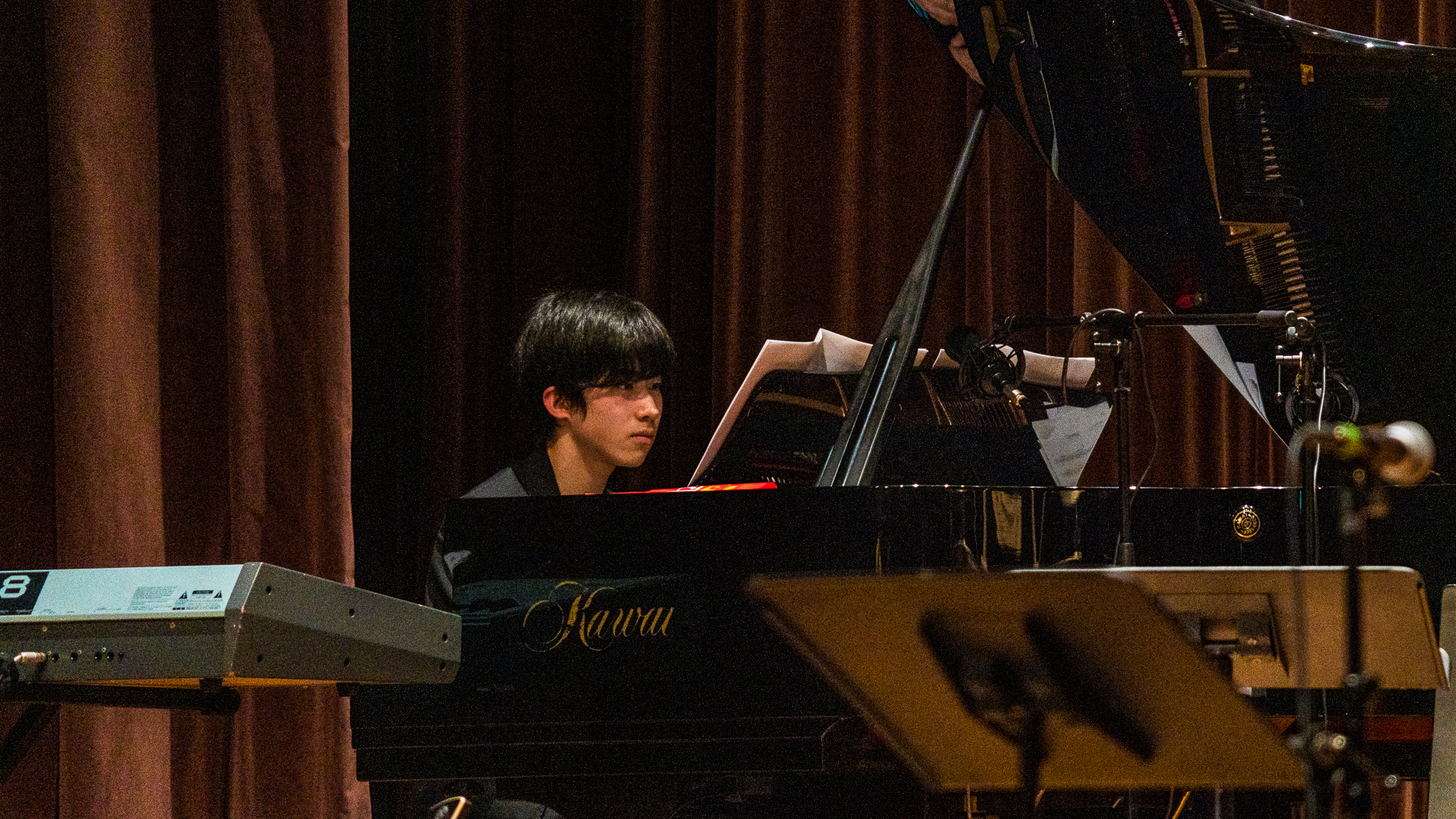
Arrangement Diary" (written by Mr. Takeba)
I would like to write a diary of our arrangements, in which I will share my memories of the songs we played and the arrangements we made. It is a long story, but I hope you will read it to the end.
Our memorable debut song was "Running Into the Night". We wanted to play a popular song, and suddenly Igarashi came up with the idea of a 6/8 time arrangement. Igarashi did not have a PC at the time, so the only handwritten score of 691*324 was used. He must have had a hard time writing it, but I remember that I also had a little trouble reading it (laugh).
Next was "Marunouchi Sadistic. Igarashi's love for Ringo Shiina influenced him to choose this song. At first, there was no sheet music for this song, but Igarashi made a sheet music for the live version because it was arranged differently. The difference between swinging and non-swinging made it difficult for each of them to play it.
At the festival in the second year of high school, we performed "March of the Saints," but to tell the truth, the members don't remember it properly. As with all the songs after this one, there is no sheet music for basic jazz songs. We would just check the number of bars, and the rest was up to us.
Igarashi arranged "Farewell Song" into bossa nova for the second year of high school's Sanbokai. By lowering the semitone, he created an atmosphere that suited the tone of the flugelhorn, and Mr. Maeda gave high marks to this arrangement. Then there was "All of them are at the reunion party," which was the only song performed three times at the show. I chose this song because I like "It's Always Midnight," and also because it was a song about a three-way meeting, but I did not expect it to be so well received by the members. I am a musician who produces scores faithful to the original songs, but the drums on this song were so difficult that I ended up strangling myself....
When I first wanted to play "Treasure Island" for the new band in my senior year of high school, I was chosen with the simple idea that "Then we should play the new Treasure Island, too, because it sounds interesting. I think it turned out to be a good choice to let the new students get to know the band piece and the famous piece played by the brass band.
At the cultural festival for the senior high school students, one of the volunteer groups performed "Theme from Lupin III," which was the first song in a performance lasting more than 30 minutes. Yoshida's love for songs from this era led him to choose this song (although he really wanted to include the chorus...). The high tone of the trumpet is a bit harsh, but overall, all parts of the arrangement are easy to play, and I think the arrangement is the most perfect.
Kareha" was performed by four members, as it was still a jazz band. Later, Mr. Kokubu, the head of the music department, suggested that we should have let the audience choose between swing and bossa nova.
The interlude of "Hello Kitty" was cool, contrary to its name, and Takeba arranged it for the band. This song may be the only song that is full of brightness.
The song "Merry-Go-Round of Life" was a remnant of a song we used to play in between rehearsals. Igarashi had purchased a pianica, and I was thrilled that he was able to express the somewhat fragile feeling of the introduction so well.
The song was almost 7 minutes long, so Watanabe was asked not to practice it on the day of the concert to keep his stamina up.
Finally, the last song performed at the last live. SUN" was chosen as the one with the highest karaoke score among several candidates. The guitar part was surprisingly detailed and Yoshida had a hard time with it.
Igarashi arranged "Maou" into a tango version. The piano was cool enough to make it seem less difficult, but until the rehearsal on the day of the performance, it seemed as if "this was a bad idea. Nevertheless, the band played through the piece on stage.
For "The Long and Short Festival," the three members decided to play a song that they were all familiar with. Igarashi himself always chooses the synthesizer sounds, and it is a mystery how he, who is not particularly skilled with machines, is able to find the perfect sound.
Splattack!" was the first time for Igarashi to play guitar, so I arranged it for the twin guitars. In fact, the score for this song was ready by the end of November. This was due to the fact that we were planning to hold a Christmas concert.
We also played some of our own compositions at the concert, but I'm sure there are many things I would like to write about each of them, so I'll leave that for another time.
Lastly, "SING SING SING". Haruhara happened to have a brass band version of the song, so the score was written based on it. Mr. Maeda, who played the difficult piano solo that Igarashi had devised, practiced a lot, and sometimes spent an hour or so in his classroom staring at the demo soundtrack for a single song. I am truly grateful to him for being like a colleague who creates music together with me, and not just as a teacher.
Without joking, I think that Igarashi and I spent a total of more than 100 hours working on the score. Of course, we were paid nothing because it was our own performance. However, we can only hope that if you ever ask someone else to produce a score for you, you will be sure to express your gratitude.
Thank you for reading to the end.
691*324
